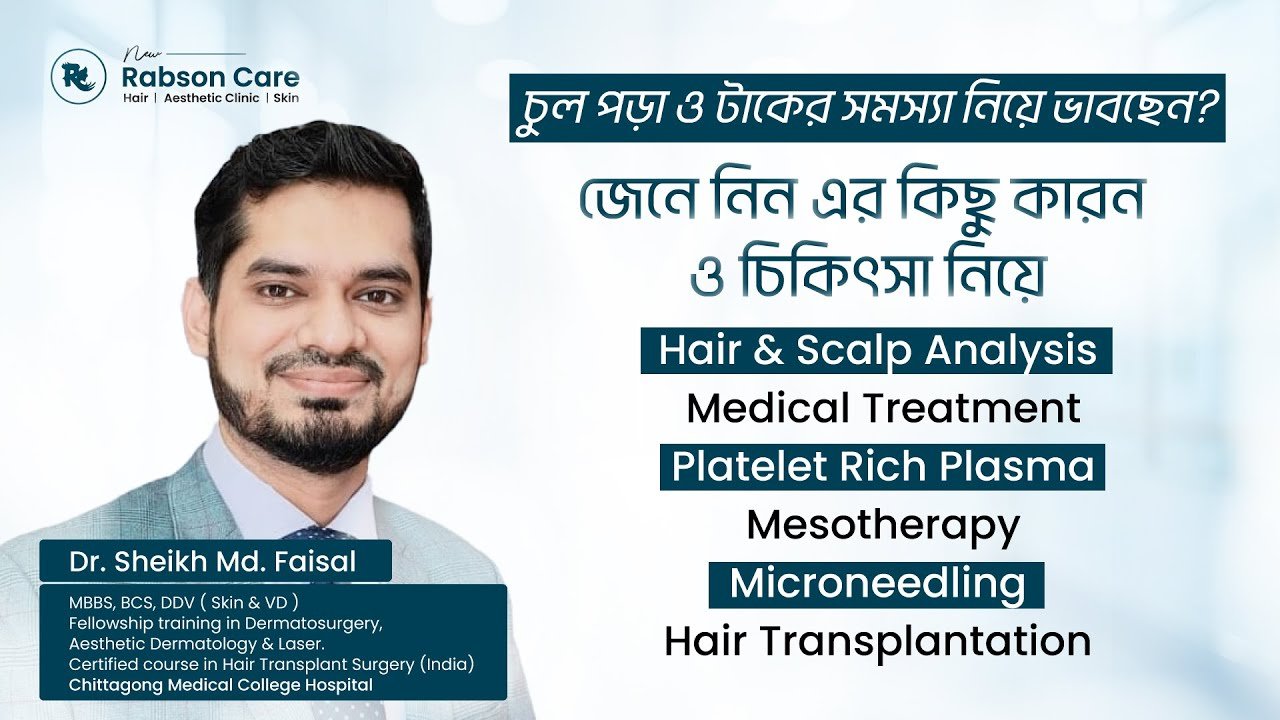Causes and Treatments of Hair Fall: Insights by Dr. Sheikh Mohammad Faisal
Assalamu Alaikum, I am Dr. Sheikh Mohammad Faisal, a dermatologist. Hair fall is a common problem that many people face in Chittagong. Losing up to 50-100 hairs a day is normal but if you are losing too much, it can cause baldness. In this article, I will explain the reasons for hair fall and the treatments available.
Understanding Hair Fall
Hair fall happens for different reasons like genetics, health problems, and lifestyle habits. Let’s look at some of the main causes:
Androgenetic Alopecia
One of the most common reasons for hair loss is androgenetic alopecia, also known as male and female pattern baldness. This is mostly genetic and caused by sensitivity to certain hormones.
- In Men: Hair loss starts from the front and forms an “M” shape.
- In Women: Hair becomes thin at the top of the head, but complete baldness is rare.
This usually starts in the late twenties or early thirties, but for some people, it can happen earlier. The hair follicles shrink over time, making the hair thinner before stopping growth completely.
Hormonal Imbalance
Hormonal problems like thyroid disorders (hyperthyroidism and hypothyroidism) can cause hair loss. Some women with high androgen (male hormone) levels can face problems like hair thinning. Conditions like polycystic ovary syndrome (PCOS) can also lead to excessive hair fall in women.
Pregnancy and menopause can also cause hair fall due to hormonal changes. Many women experience temporary hair loss after childbirth, called postpartum hair shedding, which usually stops after a few months.
Lack of Nutrition
Your body needs proper vitamins and minerals for strong and healthy hair. If you don’t get enough nutrients, hair loss can happen. Some important ones include:
- Iron: Low iron levels, especially in women, can cause hair fall.
- Vitamins: Lack of vitamin D, biotin, and other important nutrients can weaken hair.
- Protein: Our Hair is made of a protein called keratin. If you have a low-protein diet, your hair will become weak and easy to fall out.
Skipping meals and mainly eating junk foods can make these deficiencies worse. A good diet with fruits, vegetables, meat, and whole grains can help keep your hair healthy.
Scalp Diseases
Skin conditions like dandruff, seborrheic dermatitis, and psoriasis can harm the scalp and lead to hair fall. Fungal infections can also damage hair follicles and cause excessive hair shedding.
Proper scalp hygiene, using medicated shampoos, and consulting a dermatologist can help control these conditions and prevent further hair loss.
Lifestyle Factors
Stress, unhealthy eating, and pollution also affect hair health. High stress, too much junk food, and lack of sleep can make hair roots weak.
- Chronic Stress: High stress levels release a hormone called cortisol, which disrupts hair growth and leads to excessive shedding.
- Smoking and Alcohol: These habits reduce blood circulation to the scalp, making hair weak and more likely to fall out.
- Excessive Heat Styling: Using heat tools like straighteners and curling irons too often can damage hair cuticles, causing breakage and thinning.
Treatment Options for Hair Fall
If you are experiencing hair loss, it is important to find the main cause. There are many treatments available.
Medical Treatments
- Minoxidil: A common spray or solution applied to the scalp to help hair grow.
- Finasteride and Dutasteride: Medicines that stop hair loss, especially in men.
- Supplements: Doctors may recommend vitamins and minerals to improve hair strength.
- Anti-Dandruff and Medicated Shampoos: These help reduce scalp irritation and dandruff-related hair fall.
Advanced Treatments
Some modern treatments give great results in stopping hair fall and regrowing hair:
- PRP (Platelet-Rich Plasma): A patient’s own blood is used to extract growth factors, which are injected into the scalp to help hair grow. Click here to know more about this treatment.
- Mesotherapy: A mix of vitamins, minerals, and growth boosters is injected into the scalp to make hair healthy. It can be combined with PRP for better results.
- Microneedling: Small needles create tiny holes in the scalp to increase blood flow and improve the effect of PRP or mesotherapy.
Best Hair Transplant in Chittagong
For people with severe hair loss, hair transplantation is a great option. Healthy hair from the back of the scalp is moved to bald areas. This treatment gives natural and long-lasting results. There are two common types:
- FUE (Follicular Unit Extraction) & FUT (Follicular Unit Transplantation. You can get the Cheapest and Best Hair Transplant Service in Chittagong at New Rabson Care.
Natural Remedies for Hair Fall
Some people prefer natural remedies to reduce hair fall. Here are a few home treatments:
- Aloe Vera: Soothes the scalp and reduces dandruff.
- Onion Juice: Improves blood circulation and strengthens hair roots.
- Coconut Oil Massage: Nourishes the scalp and prevents hair thinning.
- Green Tea Rinse: Contains antioxidants that promote hair growth.
While natural remedies can help, they work best when combined with proper medical treatment.
Conclusion
Hair fall can happen due to many reasons like genetics, hormones, and lifestyle. But there are different treatments available, from medicines to advanced procedures like PRP and hair transplants. If you are facing hair loss, it is best to consult a dermatologist to find the right solution for you.
A healthy lifestyle, proper nutrition, and the right hair care routine can help keep your hair strong and healthy.
Thank you for reading!



